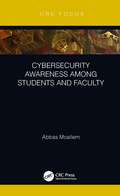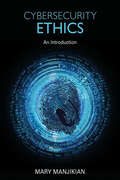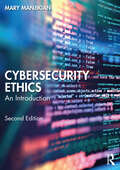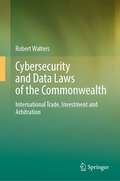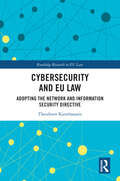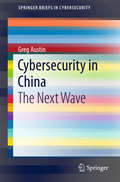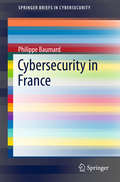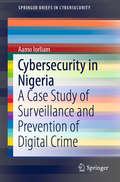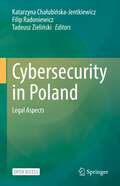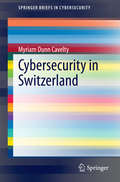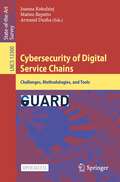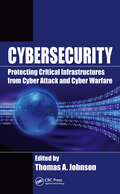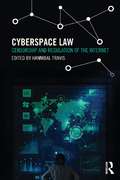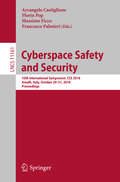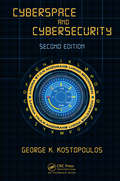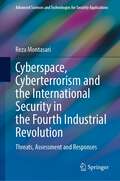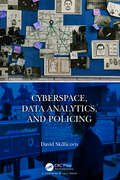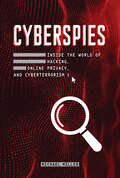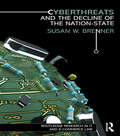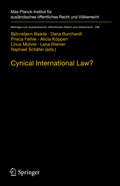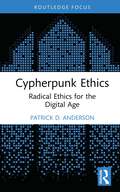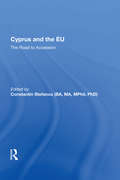- Table View
- List View
Cybersecurity Awareness Among Students and Faculty
by Abbas MoallemIn modern times, all individuals need to be knowledgeable about cybersecurity. They must have practical skills and abilities to protect themselves in cyberspace. What is the level of awareness among college students and faculty, who represent the most technologically active portion of the population in any society? According to the Federal Trade Commission’s 2016 Consumer Sentinel Network report, 19 percent of identity theft complaints came from people under the age of 29. About 74,400 young adults fell victim to identity theft in 2016. This book reports the results of several studies that investigate student and faculty awareness and attitudes toward cybersecurity and the resulting risks. It proposes a plan of action that can help 26,000 higher education institutions worldwide with over 207 million college students, create security policies and educational programs that improve security awareness and protection. Features Offers an understanding of the state of privacy awareness Includes the state of identity theft awareness Covers mobile phone protection Discusses ransomware protection Discloses a plan of action to improve security awareness
Cybersecurity Ethics: An Introduction
by Mary ManjikianThis new textbook offers an accessible introduction to the topic of cybersecurity ethics. The book is split into three parts. Part I provides an introduction to the field of ethics, philosophy and philosophy of science, three ethical frameworks – virtue ethics, utilitarian ethics and communitarian ethics – and the notion of ethical hacking. Part II applies these frameworks to particular issues within the field of cybersecurity, including privacy rights, intellectual property and piracy, surveillance, and cyberethics in relation to military affairs. The third part concludes by exploring current codes of ethics used in cybersecurity. The overall aims of the book are to: provide ethical frameworks to aid decision making; present the key ethical issues in relation to computer security; highlight the connection between values and beliefs and the professional code of ethics. The textbook also includes three different features to aid students: ‘Going Deeper’ provides background information on key individuals and concepts; ‘Critical Issues’ features contemporary case studies; and ‘Applications’ examine specific technologies or practices which raise ethical issues. The book will be of much interest to students of cybersecurity, cyberethics, hacking, surveillance studies, ethics and information science.
Cybersecurity Ethics: An Introduction
by Mary ManjikianThis textbook offers an accessible introduction to the topic of cybersecurity ethics. The second edition has been revised and updated, and contains new chapters on social justice, AI, and Big Data. The book is split into three parts. Part I provides an introduction to the field of ethics, philosophy, and philosophy of science, three ethical frameworks – virtue ethics, utilitarian ethics, and communitarian ethics – and the notion of ethical hacking. Part II applies these frameworks to particular issues within the field of cybersecurity, including privacy rights, surveillance, and intellectual property. The third part concludes by exploring current codes of ethics used in cybersecurity, with chapters on artificial intelligence, social diversity, Big Data, and cyberwarfare. The overall aims of the book are to: Provide ethical frameworks to aid decision-making Present the key ethical issues in relation to computer security Highlight the connection between values and beliefs and the professional code of ethics The textbook also includes three different features to aid students: "Going Deeper" features provide background on individuals, events, and institutions in cybersecurity; "Critical Issues" features contemporary case studies; and "Tech Talks" contain features that assume some familiarity with technological developments. The book will be of much interest to students of cybersecurity, cyberethics, hacking, surveillance studies, ethics, and information science.
Cybersecurity and Data Laws of the Commonwealth: International Trade, Investment and Arbitration
by Robert WaltersThe book has been authored by a highly regarded international legal scholar in commercial and private law. The book highlights how the legal landscape for in data protection, cross-border data flows and cybersecurity law is highly diverse and fragmented amongst all commonwealth countries. The book focuses on addressing the gaps in data, cybersecurity and national arbitration law of these countries. The aim of this book is to promote more engagement between commonwealth countries, to ensure they capitalise on the growing digital economy. Notwithstanding the above, the digital economy is rapidly changing the way we work and live. When coupled together cybersecurity and data law will be an important component of the future digital economy. They will both be integral to transnational trade and investment. That said, there will likely be disputes, and international arbitration can be an effective legal mechanism to resolve trade and investment disputes across the digital economy. On that basis, this book augments how the respective laws of commonwealth countries, along with the model data and cyber laws of the Commonwealth should be reviewed to minimise any legal divergence. This book provides a comparison and practical guide for academics, students, and the business community of the current day data protection laws and cross-border data flows among all commonwealth countries.
Cybersecurity and EU Law: Adopting the Network and Information Security Directive (Routledge Research in EU Law)
by Theodoros KarathanasisCybersecurity is set to be one of the dominant themes in EU governance in the coming years, and EU law has begun to adapt to the challenges presented by security with the adoption of the Network and Information Security (NIS) Directive. This book explores the binding effects of the legal instruments and analyzes the impact of the constraining factors originating from NIS-related domestic policies across Finland, France, Greece, Ireland, Luxembourg, and Poland upon the transposition of the NIS Directive.Combining insights from law and political science, the book offers a comparative empirical analysis of national policies and regulations regarding network and information security, as well as the national legal framework deriving from the NIS Directive’s transposition. The book argues that the more the Directives offer a regulatory leeway to EU Member States for the transposition of their content, the more the preservation of national interests by EU Member States affects the uniform application of directives across the EU. Highlighting the need to go beyond the study of the legal compliance of European directives, the volume offers a new perspective on the interests of Member States and European law, bridging the gap between the politics and law of European integration.It will be of interest to students, academics, and practitioners with an interest in EU Law and cybersecurity.
Cybersecurity in China: The New Wave (Springerbriefs In Cybersecurity Ser.)
by Greg AustinThis book offers the first benchmarking study of China’s response to the problems of security in cyber space. There are several useful descriptive books on cyber security policy in China published between 2010 and 2016. As a result, we know quite well the system for managing cyber security in China, and the history of policy responses. What we don’t know so well, and where this book is useful, is how capable China has become in this domain relative to the rest of the world. This book is a health check, a report card, on China’s cyber security system in the face of escalating threats from criminal gangs and hostile states. The book also offers an assessment of the effectiveness of China’s efforts. It lays out the major gaps and shortcomings in China’s cyber security policy. It is the first book to base itself around an assessment of China’s cyber industrial complex, concluding that China does not yet have one. As Xi Jinping said in July 2016, the country’s core technologies are dominated by foreigners.
Cybersecurity in France (SpringerBriefs in Cybersecurity)
by Philippe BaumardThis Brief presents the overarching framework in which each nation is developing its own cyber-security policy, and the unique position adopted by France. Modern informational crises have penetrated most societal arenas, from healthcare, politics, economics to the conduct of business and welfare. Witnessing a convergence between information warfare and the use of "fake news", info-destabilization, cognitive warfare and cyberwar, this book brings a unique perspective on modern cyberwarfare campaigns, escalation and de-escalation of cyber-conflicts. As organizations are more and more dependent on information for the continuity and stability of their operations, they also become more vulnerable to cyber-destabilization, either genuine, or deliberate for the purpose of gaining geopolitical advantage, waging wars, conducting intellectual theft and a wide range of crimes. Subsequently, the regulation of cyberspace has grown into an international effort where public, private and sovereign interests often collide. By analyzing the particular case of France national strategy and capabilities, the authors investigate the difficulty of obtaining a global agreement on the regulation of cyber-warfare. A review of the motives for disagreement between parties suggests that the current regulation framework is not adapted to the current technological change in the cybersecurity domain. This book suggests a paradigm shift in handling and anchoring cyber-regulation into a new realm of behavioral and cognitive sciences, and their application to machine learning and cyber-defense.
Cybersecurity in Nigeria: A Case Study of Surveillance and Prevention of Digital Crime (SpringerBriefs in Cybersecurity)
by Aamo IorliamThis book reviews the use of digital surveillance for detecting, investigating and interpreting fraud associated with critical cyberinfrastructures in Nigeria, as it is well known that the country’s cyberspace and cyberinfrastructures are very porous, leaving too much room for cyber-attackers to freely operate. In 2017, there were 3,500 successful cyber-attacks on Nigerian cyberspace, which led to the country losing an estimated 450 million dollars. These cybercrimes are hampering Nigeria’s digital economy, and also help to explain why many Nigerians remain skeptical about Internet marketing and online transactions. If sensitive conversations using digital devices are not well monitored, Nigeria will be vulnerable to cyber-warfare, and its digital economy, military intelligence, and related sensitive industries will also suffer. The Nigerian Army Cyber Warfare Command was established in 2018 in order to combat terrorism, banditry, and other attacks by criminal groups in Nigeria. However, there remains an urgent need to produce digital surveillance software to help law enforcement agencies in Nigeria to detect and prevent these digitally facilitated crimes. The monitoring of Nigeria’s cyberspace and cyberinfrastructure has become imperative, given that the rate of criminal activities using technology has increased tremendously. In this regard, digital surveillance includes both passive forensic investigations (where an attack has already occurred) and active forensic investigations (real-time investigations that track attackers). In addition to reviewing the latest mobile device forensics, this book covers natural laws (Benford’s Law and Zipf’s Law) for network traffic analysis, mobile forensic tools, and digital surveillance software (e.g., A-BOT). It offers valuable insights into how digital surveillance software can be used to detect and prevent digitally facilitated crimes in Nigeria, and highlights the benefits of adopting digital surveillance software in Nigeria and other countries facing the same issues.
Cybersecurity in Poland: Legal Aspects
by Katarzyna Chałubińska-Jentkiewicz Filip Radoniewicz Tadeusz ZielińskiThis open access book explores the legal aspects of cybersecurity in Poland. The authors are not limited to the framework created by the NCSA (National Cybersecurity System Act – this act was the first attempt to create a legal regulation of cybersecurity and, in addition, has implemented the provisions of the NIS Directive) but may discuss a number of other issues. The book presents international and EU regulations in the field of cybersecurity and issues pertinent to combating cybercrime and cyberterrorism. Moreover, regulations concerning cybercrime in a few select European countries are presented in addition to the problem of collision of state actions in ensuring cybersecurity and human rights. The advantages of the book include a comprehensive and synthetic approach to the issues related to the cybersecurity system of the Republic of Poland, a research perspective that takes as the basic level of analysis issues related to the security of the state and citizens, and the analysis of additional issues related to cybersecurity, such as cybercrime, cyberterrorism, and the problem of collision between states ensuring security cybernetics and human rights. The book targets a wide range of readers, especially scientists and researchers, members of legislative bodies, practitioners (especially judges, prosecutors, lawyers, law enforcement officials), experts in the field of IT security, and officials of public authorities. Most authors are scholars and researchers at the War Studies University in Warsaw. Some of them work at the Academic Centre for Cybersecurity Policy – a thinktank created by the Ministry of National Defence of the Republic of Poland.
Cybersecurity in Switzerland (SpringerBriefs in Cybersecurity)
by Myriam Dunn CaveltyGives the reader a detailed account of how cyber-security in Switzerland has evolved over the years, using official documents and a considerable amount of inside knowledge. It focuses on key ideas, institutional arrangements, on the publication of strategy papers, and importantly, on processes leading up to these strategy documents. The peculiarities of the Swiss political system, which influence the way cyber-security can be designed and practiced in Switzerland are considered, as well as the bigger, global influences and driving factors that shaped the Swiss approach to cyber-security. It shows that throughout the years, the most important influence on the Swiss policy-approach was the international level, or rather the developments of a cyber-security policy in other states. Even though many of the basic ideas about information-sharing and public-private partnerships were influenced by (amongst others) the US approach to critical infrastructure protection, the peculiarities of the Swiss political system has led to a particular "Swiss solution", which is based on the federalist structures and subsidiary principles, characterized by stability and resilience to external shocks in the form of cyber-incidents. Cybersecurity in Switzerland will be a stimulating read for anybody interested in cyber-security policy, including students, researchers, analysts and policy makers. It contains not only specific material on an interesting case, but also a wealth of background information on different variations of cyber-security, as well as on information-sharing and public-private partnerships.
Cybersecurity of Digital Service Chains: Challenges, Methodologies, and Tools (Lecture Notes in Computer Science #13300)
by Joanna Kołodziej Matteo Repetto Armend DuzhaThis open access book presents the main scientific results from the H2020 GUARD project. The GUARD project aims at filling the current technological gap between software management paradigms and cybersecurity models, the latter still lacking orchestration and agility to effectively address the dynamicity of the former. This book provides a comprehensive review of the main concepts, architectures, algorithms, and non-technical aspects developed during three years of investigation; the description of the Smart Mobility use case developed at the end of the project gives a practical example of how the GUARD platform and related technologies can be deployed in practical scenarios. We expect the book to be interesting for the broad group of researchers, engineers, and professionals daily experiencing the inadequacy of outdated cybersecurity models for modern computing environments and cyber-physical systems.
Cybersecurity: Protecting Critical Infrastructures from Cyber Attack and Cyber Warfare
by Thomas A. JohnsonThe World Economic Forum regards the threat of cyber attack as one of the top five global risks confronting nations of the world today. Cyber attacks are increasingly targeting the core functions of the economies in nations throughout the world. The threat to attack critical infrastructures, disrupt critical services, and induce a wide range of dam
Cyberspace Law: Censorship and Regulation of the Internet (Routledge Research in Information Technology and E-Commerce Law)
by Hannibal TravisThis book explores what the American Civil Liberties Union calls the "third era" in cyberspace, in which filters "fundamentally alter the architectural structure of the Internet, with significant implications for free speech." Although courts and nongovernmental organizations increasingly insist upon constitutional and other legal guarantees of a freewheeling Internet, multi-national corporations compete to produce tools and strategies for making it more predictable. When Google attempted to improve our access to information containing in books and the World Wide Web, copyright litigation began to tie up the process of making content searchable, and resulted in the wrongful removal of access to thousands if not millions of works. Just as the courts were insisting that using trademarks online to criticize their owners is First Amendment-protected, corporations and trade associations accelerated their development of ways to make Internet companies liable for their users’ infringing words and actions, potentially circumventing free speech rights. And as social networking and content-sharing sites have proliferated, so have the terms of service and content-detecting tools for detecting, flagging, and deleting content that makes one or another corporation or trade association fear for its image or profits. The book provides a legal history of Internet regulation since the mid-1990s, with a particular focus on efforts by patent, trademark, and copyright owners to compel Internet firms to monitor their online offerings and remove or pay for any violations of the rights of others. This book will be of interest to students of law, communications, political science, government and policy, business, and economics, as well as anyone interested in free speech and commerce on the internet.
Cyberspace Safety and Security: 10th International Symposium, CSS 2018, Amalfi, Italy, October 29–31, 2018, Proceedings (Lecture Notes in Computer Science #11161)
by Florin Pop Arcangelo Castiglione Francesco Palmieri Massimo FiccoThis book constitutes the proceedings of the 10th International Symposium on Cyberspace Safety and Security, CSS 2018, held in Amalfi, Italy, in October 2018. The 25 full papers presented in this volume were carefully reviewed and selected from 79 submissions.The papers focus on cybersecurity; cryptography, data security, and biometric techniques; and social security, ontologies, and smart applications.
Cyberspace and Cybersecurity (Second Edition)
by George KostopoulosProviding comprehensive coverage of cyberspace and cyber security, this textbook not only focuses on technologies but also explores human factors and organizational perspectives and emphasizes why asset identification should be the cornerstone of any information security strategy. Topics include addressing vulnerabilities, building a secure enterprise, blocking intrusions, ethical and legal issues, and business continuity. Updates include topics such as cyber risks in mobile telephony, steganography, cyber security as an added value, ransomware defense, review of recent cyber laws, new types of cyber crime, plus new chapters on digital currencies and encryption key management.
Cyberspace, Cyberterrorism and the International Security in the Fourth Industrial Revolution: Threats, Assessment and Responses (Advanced Sciences and Technologies for Security Applications)
by Reza MontasariThis book represents an interdisciplinary academic endeavour intended to provide readers with a comprehensive, balanced, and nuanced examination of critical issues at the intersection of cyberspace, cyberterrorism, and national and international security. It draws insights from a range of diverse fields, including Computer Science, Social Science, Political Science, International Relations, Criminology, and Law. Furthermore, the book investigates the field of Artificial Intelligence (AI) and related technologies, exploring their dual role in this dynamic landscape of contemporary cyberthreats, with both constructive and malicious implications.The book comprises four distinct themes, with each theme represented by a dedicated Part. Within this organisational framework, each overarching theme is systematically explored through a series of chapters, providing readers with a clear and thematic roadmap for their journey through the content.Part I, Understanding Terrorism and Counter-Terrorism Strategies, of the book explores complexities surrounding contemporary global security challenges. It serves as the foundational segment of the book, consisting of three chapters that critically analyse various dimensions of terrorism and the strategies implemented to combat it.Part II, Cyberterrorism Landscape, of the book offers an in-depth assessment of the current cyberterrorism landscape. This section comprises two critical chapters, each contributing to a comprehensive understanding of the contemporary threats posed by cyberterrorism and their implications for national security.Part III, Countering Cyberterrorism with Technology, of the book forms the core of the book’s exploration into leveraging technology to mitigate the threats of cyberterrorism. This section includes four critical chapters, collectively providing an in-depth understanding of the intersection between technology and counterterrorism strategies.Part IV, Artificial Intelligence and National and International Security, of the book delves into the complex relationship between AI technology and the broader security landscape. Comprising three pivotal chapters, this section provides a detailed understanding of AI’s transformative role in shaping the future of national and international security.This comprehensive resource serves as a valuable reference for law enforcement, policymakers, cybersecurity experts, researchers, academics, and technology enthusiasts interested in counter-terrorism efforts. By exploring the intricate landscape of cyberspace, this book equips readers with knowledge essential to addressing the evolving challenges posed by cyber terrorism.This comprehensive resource serves as a valuable reference for law enforcement, policymakers, cybersecurity experts, researchers, academics, and technology enthusiasts interested in counter-terrorism efforts. By exploring the intricate landscape of cyberspace, this book equips readers with knowledge essential to addressing the evolving challenges posed by cyber terrorism.This comprehensive resource serves as a valuable reference for law enforcement, policymakers, cybersecurity experts, researchers, academics, and technology enthusiasts interested in counter-terrorism efforts. By exploring the intricate landscape of cyberspace, this book equips readers with knowledge essential to addressing the evolving challenges posed by cyber terrorism.This comprehensive resource serves as a valuable reference for law enforcement, policymakers, cybersecurity experts, researchers, academics, and technology enthusiasts interested in counter-terrorism efforts. By exploring the intricate landscape of cyberspace, this book equips readers with knowledge essential to addressing the evolving challenges posed by cyber terrorism.This comprehensive resource serves as a valuable reference for law enforcement, policymakers, cybersecurity experts, researchers, academics, and technology enthusiasts interested in counter-terrorism efforts. By exploring the in
Cyberspace, Data Analytics, and Policing
by David SkillicornCyberspace is changing the face of crime. For criminals it has become a place for rich collaboration and learning, not just within one country; and a place where new kinds of crimes can be carried out, and a vehicle for committing conventional crimes with unprecedented range, scale, and speed. Law enforcement faces a challenge in keeping up and dealing with this new environment. The news is not all bad – collecting and analyzing data about criminals and their activities can provide new levels of insight into what they are doing and how they are doing it. However, using data analytics requires a change of process and new skills that (so far) many law enforcement organizations have had difficulty leveraging. Cyberspace, Data Analytics, and Policing surveys the changes that cyberspace has brought to criminality and to policing with enough technical content to expose the issues and suggest ways in which law enforcement organizations can adapt. Key Features: Provides a non-technical but robust overview of how cyberspace enables new kinds of crime and changes existing crimes. Describes how criminals exploit the ability to communicate globally to learn, form groups, and acquire cybertools. Describes how law enforcement can use the ability to collect data and apply analytics to better protect society and to discover and prosecute criminals. Provides examples from open-source data of how hot spot and intelligence-led policing can benefit law enforcement. Describes how law enforcement can exploit the ability to communicate globally to collaborate in dealing with trans-national crime.
Cyberspies: Inside the World of Hacking, Online Privacy, and Cyberterrorism
by Michael MillerThe news is filled with stories of data breaches at companies and of threats to national security as hackers interfere with elections. It's more important than ever for internet users to know how to maintain their privacy online. The digital world has become inescapable, and to be a responsible digital citizen, it is necessary to be aware of the threats to your online privacy and security. This book looks at the legal and illegal forms of cyberspying, goes behind the scenes to explore career paths in cyberintelligence, and looks at the digital threats of cyber propaganda, fake news, cyberterrorism, and threats to the US government and individuals. Readers will learn tools to keep themselves safe and protect their privacy, as well as tips for what to do if they are attacked online, and a final chapter looks at how digitally savvy teens can prepare for a career in cyberintelligence.
Cyberthreats and the Decline of the Nation-State: Cyberthreats And The Decline Of The Nation-state (Routledge Research in Information Technology and E-Commerce Law)
by Susan W. BrennerThis book explores the extraordinary difficulties a nation-state’s law enforcement and military face in attempting to prevent cyber-attacks. In the wake of recent assaults including the denial of service attack on Estonia in 2007 and the widespread use of the Zeus Trojan Horse software, Susan W. Brenner explores how traditional categories and procedures inherent in law enforcement and military agencies can obstruct efforts to respond to cyberthreats. Brenner argues that the use of a territorially-based system of sovereignty to combat cyberthreats is ineffective, as cyberspace erodes the import of territory. This problem is compounded by the nature of cybercrime as a continually evolving phenomenon driven by rapid and complex technological change. Following an evaluation of the efficacy of the nation-state, the book goes on to explore how individuals and corporations could be integrated into a more decentralized, distributed system of cyberthreat control. Looking at initiatives in Estonia and Sweden which have attempted to incorporate civilians into their cyber-response efforts, Brenner suggests that civilian involvement may mediate the rigid hierarchies that exist among formal agencies and increase the flexibility of any response. This book will be of great interest to students and researchers of information technological law and security studies.
Cynical International Law?: Abuse and Circumvention in Public International and European Law (Beiträge zum ausländischen öffentlichen Recht und Völkerrecht #296)
by Björnstjern Baade Dana Burchardt Prisca Feihle Alicia Köppen Linus Mührel Lena Riemer Raphael SchäferAnalysing international law through the prism of “cynicism” makes it possible to look beyond overt disregard for international law, currently discussed in terms of a backlash or crisis. The concept allows to analyse and criticise structural features and specific uses of international law that seem detrimental to international law in a more subtle way. Unlike its ancient predecessor, cynicism nowadays refers not to a bold critique of power but to uses and abuses of international law that pursue one-sided interests tacitly disregarding the legal structure applied. From this point of view, the contributions critically reflect on the theoretical foundations of international law, in particular its relationship to power, actors such as the International Law Commission and international judges, and specific fields, including international human rights, humanitarian, criminal, tax and investment law.
Cypherpunk Ethics: Radical Ethics for the Digital Age (Routledge Focus on Digital Media and Culture)
by Patrick D. AndersonCypherpunk Ethics explores the moral worldview of the cypherpunks, a movement that advocates the use of strong digital cryptography—or crypto, for short—to defend individual privacy and promote institutional transparency in the digital age. Focusing on the writings of Timothy May and Julian Assange, two of the most prolific and influential cypherpunks, the book examines two competing paradigms of cypherpunk philosophy—crypto anarchy and crypto justice—and examines the implications of cypherpunk ethics for a range of contemporary moral issues, including surveillance, privacy, whistleblowing, cryptocurrencies, journalism, democracy, censorship, intellectual property, and power. Rooted in theory but with very real applications, this volume will appeal not only to students and scholars of digital media, communication, journalism, philosophy, political science, critical data studies, sociology, and the history of technology but also to technologists and activists around the world.
Cyprus and the EU: The Road to Accession
by Constantin StefanouThis informative book provides an in-depth study of Cyprus' efforts to join the European Union. It examines the various steps taken towards harmonization in various contexts, the suitability of the country for EU accession, and the political problems surrounding the Cypriot EU accession. Constantin Stefanou also broadens the scope to consider the wider issues surrounding EU accession negotiations for applicant countries, especially with reference to the new and untested EU guidelines. The volume will be of great value to those interested in Europe and the European Union in general, and European Law and the development of Cyprus in particular.
Cytomegalovirus: A Hospitalization Diary (Forms of Living)
by Hervé GuibertBy the time of his death, Herve Guibert had become a singular literary voice on the impact of AIDS in France. He was prolific. His oeuvre contained some twenty novels, including To the Friend Who Did Not Save My Life and The Compassion Protocol. He was thirty-six years old. In Cytomegalovirus, Guibert offers an autobiographical narrative of the everyday moments of his hospitalization because of complications of AIDS. Cytomegalovirus is spare, biting, and anguished. Guibert writes through the minutiae of living and of death—as a quality of invention, of melancholy, of small victories in the face of greater threats—at the moment when his sight (and life) is eclipsed.This new edition includes an Introduction and Afterword contextualizing Guibert’s work within the history of the AIDS pandemic, its relevance in the contemporary moment, and the importance of understanding the quotidian aspects of terminal illness.
Cómo Recuperarse del Divorcio: La Guía Para Superar a tu ex Cónyuge y Comenzar Nuevas Relaciones
by Steve SimonEl divorcio puede ser una de las cosas más difíciles con las que te enfrentarás en tu vida. Este puede dejar a las personas arruinadas financiera y emocionalmente. Esta guía te ayudará a a recuperarte de un divorcio y ser más feliz que nunca. Paso a paso, te mostraremos cómo podrás volver a levantarte y comenzar de nuevo. Si estás buscando sanar emocionalmente o seguir con otra relación, ¡esta guía es para ti! El libro incluye: - Un programa de recuperación eficiente y rápido. - Como aumentar tu productividad. - Como incrementar tu felicidad. - Como iniciar nuevas relaciones. - Como tratar con el trauma emocional. + ¡Y MUCHO MAS! -> Desplázate hasta la parte superior de la página y haz clic en Agregar al carrito para comprar al instante Descargo de responsabilidad: El autor y / o el (los) propietario (s) de los derechos no hacen reclamos, promesas o garantías con respecto a la exactitud, integridad o adecuación de los contenidos de este libro, y se eximen de toda responsabilidad por errores y omisiones en los contenidos que contiene. Este producto es solo para uso de referencia. Por favor, consulte a un profesional antes de tomar cualquier acción basada en cualquiera de los contenidos que se encuentran en la presente obra.
DEAD NO MORE
by L. R. Nicolello"Don't miss this exciting mix of hot romance and Black Ops." -New York Times bestselling author Catherine Coulter"Incredibly intense, beautifully written and drop dead sexy, L.R.Nicolello's Dead No More is a top-notch romantic thriller. It grabs you by the throat on the first page and doesn't let go until the very last line. Nicolello's storytelling gets better and better. You won't want to miss this one." -New York Times bestselling author J.T. EllisonThe next person you trust…may be the last…Lily Andrews was once the most sought-after undercover operative at Unit 67, a Black Ops agency buried deep within the U.S. Intelligence Community. But then her partner—and fiancé—turned rogue, leaving her for dead after a mission gone horribly wrong. Disgusted with 67's attempt to cover up Jackson's traitorous actions, Lily walked away from everything she knew and loved…and swore she'd hunt her ex down on her own and bring him to justice.When the handsome, undeniably alpha Derek Moretti needs her help to pursue a ruthless sociopath who is putting advanced weaponry into the hands of terrorists, Lily sees her chance to return to 67 with her pride intact. She didn't realize how much she'd missed the adrenaline rush of being undercover—or maybe that's the heat that races through her whenever Derek is near. But soon Lily will have to choose between the vengeance she craves and the country she's sworn to protect. And with the clock ticking down on a nuclear catastrophe, she knows that this time, if she's trusted the wrong man, she won't live to regret it…
